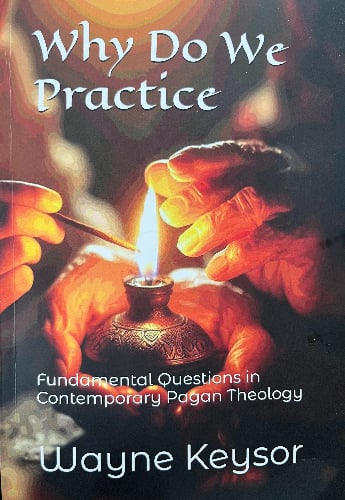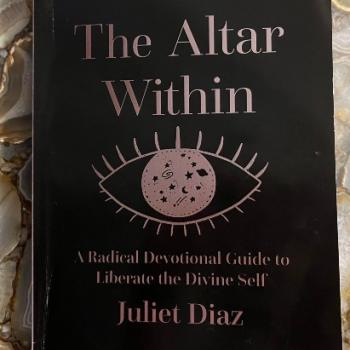I was contacted about 6 months ago by an author (Wayne Keysor) to review his book, Why Do We Practice: Fundamental Questions in Contemporary Pagan Theology. I immediately responded that I’d be happy to review the book…and then it took me 6 months to complete. Sorry, Wayne! I promise it had nothing to do with the content of your book!
TLDR; Why Do We Practice is an excellent primer in theology, explaining common theological concepts and terminology within a pagan context. This text would serve any pagan seeking to deepen their understanding of their personal or traditional practices. Let this book guide you in asking and contemplating profound questions that go beyond a typical 101-level thinking. This book isn’t designed to answer questions so much as to teach you how to ask and explore your own.
I remember once an acquaintance told me a few years ago that, “Pagans don’t do theology.” With this book in hand, I cannot see how that statement can be true. Read on for more thoughts!

“This book is dedicated to all those who doubt that they will ever truly understand by keep wondering anyway.” – Wayne Keysor
Why Do We Practice was written by Wayne Keysor and published by ADF Publishing in 2024. The book is 261 pages long of main text with an extensive bibliography at the end. Keysor accurately and consistently provided references and footnotes throughout the book. The bibliography will be of particular interest to those seeking to further their studies in philosophy and theology.
The book is divided into 9 chapters, which I appreciate because 9 is a sacred number in many pagan traditions and practices. Keysor takes the reader on a journey in which each chapter builds upon the content and questions put forth from the previous one. Topics explored throughout this text include: identifying and defining theology in terms of a pagan context; foundational theological approaches; what “contemporary paganism” actually is; understanding and building a cosmology; as well as the usefulness of religion in terms of explaining life’s greater questions, such as tragedy and death.
Keysor doesn’t provide answers to those questions so much as he helps the reader think about how a person could reflect and come to their own conclusions. I think what Keysor got right is that he avoided steering the reader to any conclusions that weren’t their own. Many of us so-called “advanced practitioners” are tired of the rote 101 books out there and are searching for something to deepen our practices. The beauty of a text such as this is that it can add an intellectual element to our practices and beliefs. Some pagans, for example, are perfectly content with simply believing and parroting that “reincarnation is real” without ever exploring how reincarnation could be true and with what evidence. There are also pagans who are content with conducting their rituals and spells without ever considering why it’s worth doing them. This text can help you consider the value in having a more profound relationship with your practices, religion, and world.
Final Thoughts
There’s much good to discuss about this book and yet I had only one critique: the text read like a graduate thesis, and really needed section headers to help break up the long swathes of text. Aside from that, I can’t say that I have anything negative to say about the content. Keysor wrote a book that was actually needed, as there are few contemporary pagan theology books out there. I do think part of the problem is that theology has been dominated by Christians for centuries, despite the fact that Christian theology is largely built upon the backs of ancient Greek philosophers. So, yes, “pagans do theology” and have done theology for much longer than anyone else.
This book would be an excellent addition to any serious practitioner’s library, particularly those individuals who might be considering clergyhood in their respective traditions. Those considering seminary would also benefit from this theological primer.
Follow me on Instagram @lady_of_the_broomstick















